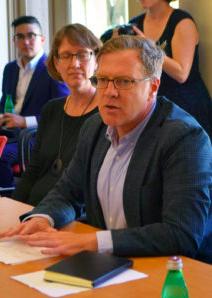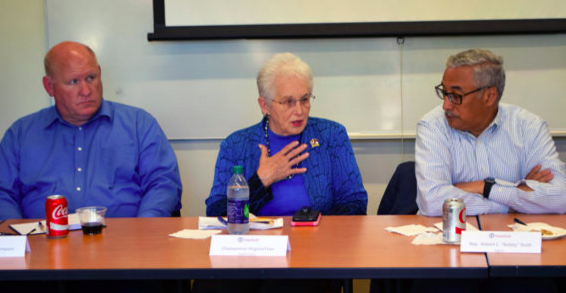Congressional representatives from around the country gathered at Stanford Graduate School of Education for a meeting with a small group of Silicon Valley entrepreneurs and Stanford faculty, where they talked about the future of educational technology and its role in sustaining a vital American workforce. 
Six members of the House Committee on Education and the Workforce came to campus for the private meeting on May 9. They were joined by leaders from eight startups working on tools to support teaching and learning.
“A well-educated workforce is one of the competitive advantages we have in this country,” said Rep. Bobby Scott (D-Va.), ranking member of the House committee. “What can technology do to improve that?”
The committee members listened as industry panelists described their innovations, which included online course platforms, an analytics system aimed at reducing college dropout rates and a network of experimental schools using personalized learning software. Some executives shared bureaucratic obstacles they’ve faced in scaling their products more widely.
The group also discussed the role research universities could play in encouraging development efforts and promoting accountability.
“How can this marketplace be disciplined in a way that incentivizes ongoing investment in innovation but is also based on ground-truth science?” asked Mitchell Stevens, a sociologist and associate professor of education, who moderated the conversation. He suggested that universities could serve as catalyst and convener, helping to create “an innovation ecosystem” in education.
Rep. Tim Walberg (R-Mich.) emphasized the need for universities to promote competencies rather than skills, so that students can adapt as the professional landscape changes over time. “It needs to be a mission of higher education to instill that importance of lifelong learning,” he said. “You may come out with a degree, but you’ll be stagnant if you have no vision for continuing to learn, to innovate, to be creative, to push the limits.”
 In addition to Scott and Walberg, the House members present included committee chairwoman Rep. Virginia Foxx (R-N.C.) and Reps. Suzanne Bonamici (D-Ore.), Mark DeSaulnier (D-Calif.) and Glenn Thompson (R-Pa.). Karin Forssell, director of the Learning, Design and Technology master’s program at the Graduate School of Education, rounded out the panel.
In addition to Scott and Walberg, the House members present included committee chairwoman Rep. Virginia Foxx (R-N.C.) and Reps. Suzanne Bonamici (D-Ore.), Mark DeSaulnier (D-Calif.) and Glenn Thompson (R-Pa.). Karin Forssell, director of the Learning, Design and Technology master’s program at the Graduate School of Education, rounded out the panel.
The tech entrepreneurs were Aaron Benz, Degree Analytics; Adam Carter, MA ’02, Summit Public Schools; Gunnar Counselman, Fidelis Education; Stuart Frye, Udacity; Jinal Jhaveri, SchoolMint; Ben Kornell, MA/MBA ’09, AltSchool; Nika Nour, Entertainmnent Software Association; and Rebecca Taber, MA/MBA ’15, Coursera.
“The definitive educational challenge of our time is making sure the widest possible swath of Americans has lifelong access to prosperous employment,” Stevens said. “There’s a flexibility and a canniness that’s built into the character of Northern California that I think is well represented here at this table.”
___
Photos by Katherine Chesley/Stanford News Service. Top right: Mitchell Stevens. Bottom left: Reps. Glenn Thompson of Pennsylvania, Virginia Foxx of North Carolina and Bobby Scott of Virginia.